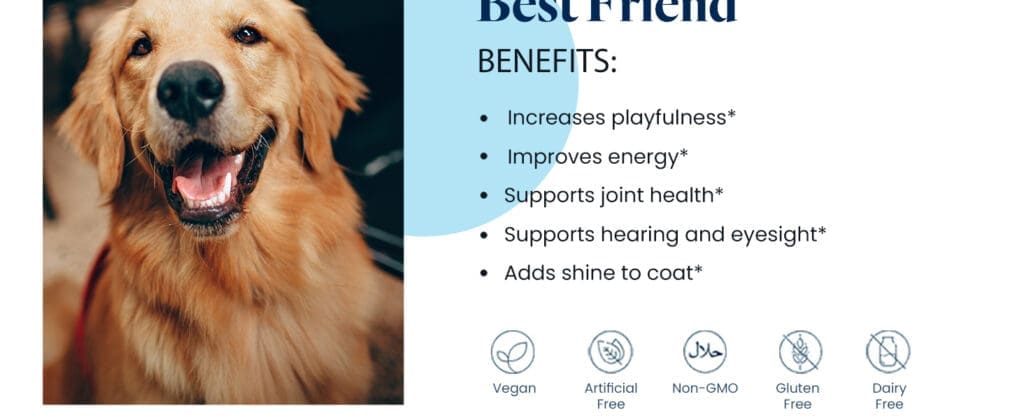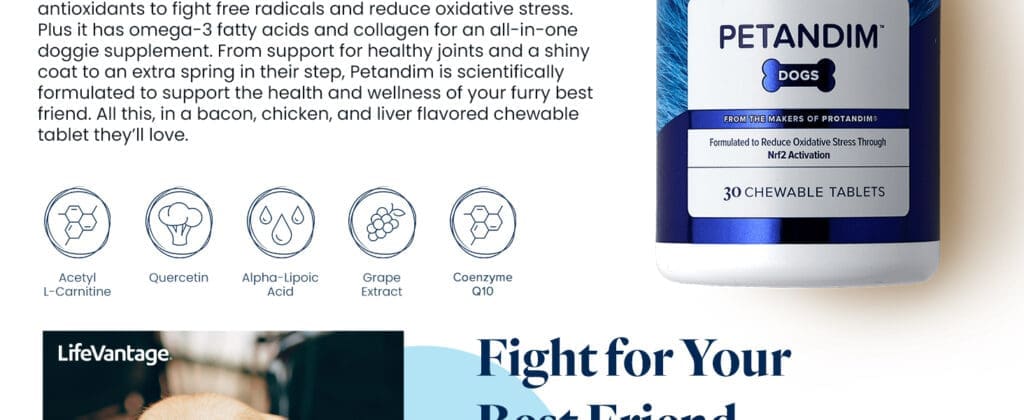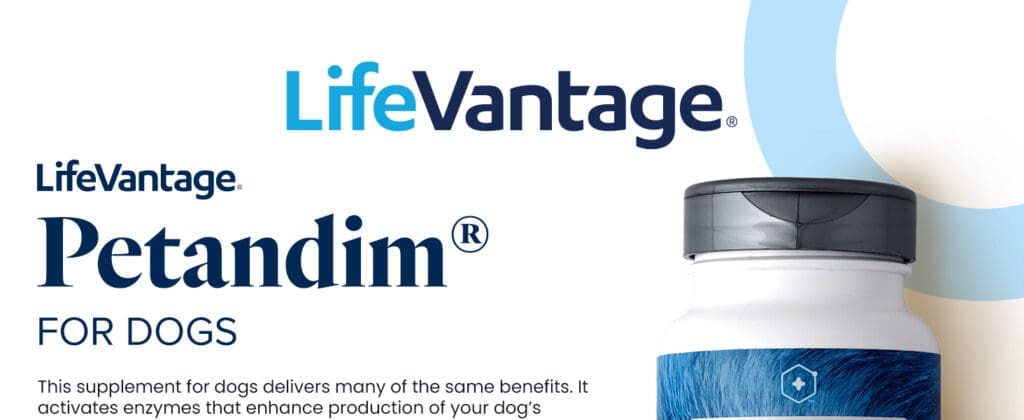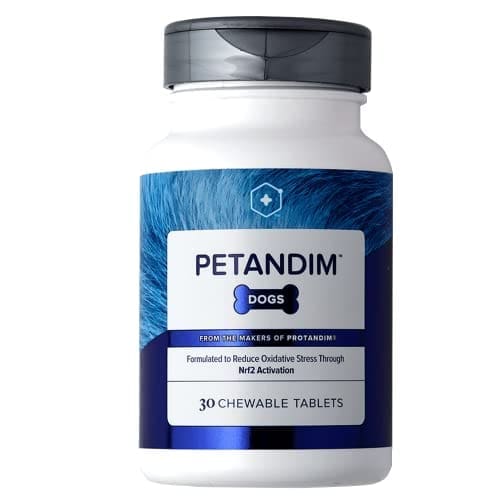Picture this: your beloved furry companion, once sprightly and full of zest, now moves a little slower, perhaps showing signs of age that break your heart. Imagine if there were a way to significantly enhance your dog’s vitality and health, allowing them more happy and active years by your side. Welcome to the mind-blowing world of nutrigenomics – a cutting-edge science that’s not only revolutionizing human health but also extending its transformative touch to our loyal canine friends.
In this eye-opening blog post, we delve into the fusion of genetics and nutrition known as nutrigenomics, exploring how this innovative field is reshaping dog health and aging. By understanding how specific nutrients can influence your pet’s genes, we can unlock a new dimension in veterinary care, potentially alleviating age-related ailments and extending the quality of life for dogs. From triple-blinded studies demonstrating efficiency to heartwarming stories of rejuvenated pets, we’ll uncover how nutrigenomics stands as a beacon of hope for pet owners eager to see their furry companions thrive. So, buckle up and prepare to be astonished at the ways science is making tail wags last longer and playtimes more enjoyable.
- The Science Behind Nutrigenomics and Canine Health
- Understanding the Genetic Component of Dog Aging
- Key Nutrients That Impact Canine Genes
- Benefits of Nutrigenomics in Enhancing Dog Vitality
- Case Studies: Success Stories of Nutrigenomics in Dogs
- Implementing Nutrigenomics Into Your Dog's Diet
- Potential Drawbacks and Considerations of Nutrigenomics for Dogs
- Breaking Misconceptions: Debunking Myths About Nutrigenomics
- Future Prospects: Advancements in Nutrigenomics for Dog Health
- Conclusion: Embracing a Brighter Future for Canine Aging
The Science Behind Nutrigenomics and Canine Health
Nutrigenomics, the study of how nutrients interact with our genes, is a field that has gained significant attention in recent years. This science has not only revolutionized human health but also holds immense potential for improving the well-being of our beloved canine companions. By understanding the genetic component of dog aging and the key nutrients that impact canine genes, we can unlock a new era in veterinary care.
Oxidative stress, often referred to as the internal rusting process, plays a crucial role in aging and disease development in both humans and animals. When our bodies are unable to neutralize harmful free radicals efficiently, oxidative stress occurs. This process can lead to cellular damage and contribute to various health issues.
Studies have shown that dogs also experience oxidative stress as they age. This stress can accelerate the aging process and make them more susceptible to diseases such as arthritis, cancer, and cognitive decline. However, nutrigenomics offers a promising solution by providing targeted nutrition that supports optimal gene expression and reduces oxidative stress.
Understanding the Genetic Component of Dog Aging
Just like humans, dogs have unique genetic makeups that influence their aging process. Certain genes are responsible for regulating essential functions such as cell repair, inflammation response, and antioxidant production. Understanding these genetic components allows us to identify specific nutrients that can optimize gene expression and promote healthy aging.
A groundbreaking triple-blinded study conducted on dogs demonstrated the benefits of nutrigenomics in combating age-related issues. The study involved administering a specially formulated nutrigenomic supplement to a group of senior dogs over a period of several months. The results were remarkable – the supplemented dogs showed improved mobility, increased energy levels, enhanced cognitive function, and reduced signs of joint discomfort.
This study not only validated the effectiveness of nutrigenomics in promoting canine health but also provided valuable insights into the potential of targeted nutrition for improving the quality of life in aging dogs. By harnessing the power of specific nutrients, we can positively influence gene expression and help our furry friends age gracefully.
Key Nutrients That Impact Canine Genes
Several key nutrients have been identified to have a significant impact on canine genes and overall health. These nutrients play a crucial role in reducing oxidative stress, supporting cellular repair, and promoting optimal gene expression. Let’s explore some of these essential nutrients:
1. Antioxidants: Antioxidants such as vitamins C and E, beta-carotene, and selenium help neutralize harmful free radicals and reduce oxidative stress. By incorporating antioxidant-rich foods or supplements into your dog’s diet, you can provide them with the necessary tools to combat age-related damage.
2. Omega-3 Fatty Acids: Omega-3 fatty acids, commonly found in fish oil, have powerful anti-inflammatory properties that can benefit dogs with arthritis or joint issues. These fatty acids also support brain health and cognitive function in aging dogs.
3. Phytochemicals: Phytochemicals are natural compounds found in plants that offer various health benefits. For example, curcumin from turmeric has potent anti-inflammatory properties, while resveratrol from grapes promotes cardiovascular health.
4. Probiotics: Probiotics are beneficial bacteria that support digestive health and strengthen the immune system. By maintaining a healthy gut microbiome, you can enhance your dog’s overall well-being.
Incorporating these key nutrients into your dog’s diet can have a profound impact on their genetic expression and overall health. However, it’s essential to consult with your veterinarian before making any significant changes to their diet or introducing new supplements.
Benefits of Nutrigenomics in Enhancing Dog Vitality
The benefits of nutrigenomics in enhancing dog vitality are truly remarkable. By providing targeted nutrition that supports optimal gene expression, we can help our furry friends live longer, healthier, and more active lives.
One heartwarming success story involves a loyal dog named Max. Max’s owner, Sheila, noticed that her beloved companion was slowing down and experiencing joint discomfort as he aged. Determined to improve Max’s quality of life, Sheila introduced a nutrigenomic supplement into his diet.
Within weeks, Sheila witnessed a remarkable transformation in Max. His energy levels soared, and he regained his playful spirit. The joint discomfort that once hindered his mobility significantly reduced, allowing him to enjoy long walks and playtime like never before.
Sheila couldn’t contain her joy and gratitude for the positive impact nutrigenomics had on Max’s life. She passionately endorses this revolutionary technology and encourages all pet owners to explore the possibilities it offers for their furry companions.
Case Studies: Success Stories of Nutrigenomics in Dogs
The success stories of nutrigenomics in dogs continue to inspire pet owners worldwide. Let’s take a look at some real-life examples:
1. Bailey: Bailey, an aging Labrador Retriever, struggled with cognitive decline and displayed signs of confusion and disorientation. After incorporating a nutrigenomic supplement into his diet, Bailey experienced improved mental clarity and regained his ability to navigate familiar surroundings with ease.
2. Luna: Luna, a Golden Retriever diagnosed with arthritis, faced mobility challenges that limited her daily activities. With the help of targeted nutrition, Luna’s joint discomfort reduced significantly, allowing her to enjoy walks and playtime without pain.
3. Rocky: Rocky, a senior German Shepherd, suffered from chronic skin allergies that caused constant itching and discomfort. Nutrigenomics played a crucial role in reducing inflammation and strengthening Rocky’s immune system, resulting in healthier skin and a happier dog.
These case studies highlight the immense potential of nutrigenomics in improving various aspects of canine health. By addressing specific genetic factors through targeted nutrition, we can enhance the well-being of our furry friends and provide them with a better quality of life.
LifeVantage Petandim Dog Vitamins USA Joint Skin Coat Supplement for Dogs
Reduce oxidative stress and support your dog’s cellular health, plus get the benefits of omega-3 fatty acids and collagen in a meat-flavored chewable treat.* Contents: 30 Chewable Tablets Benefits of Petandim Dog: Increases playfulness Improves energy Supports joint health Supports hearing and eyesight Adds shine to coat
Implementing Nutrigenomics Into Your Dog’s Diet
If you’re considering implementing nutrigenomics into your dog’s diet, it’s essential to approach it with careful consideration and guidance from your veterinarian. Here are some steps to help you get started:
1. Consult Your Veterinarian: Schedule an appointment with your veterinarian to discuss your dog’s specific needs and determine if nutrigenomics is suitable for them.
2. Assess Your Dog’s Health: Evaluate your dog’s current health status and identify any age-related issues or concerns that could benefit from targeted nutrition.
3. Research Nutrigenomic Supplements: Look for reputable nutrigenomic supplements that are specifically formulated for dogs. Ensure they contain key nutrients known to support optimal gene expression and reduce oxidative stress.
4. Gradually Introduce Changes: Make dietary changes gradually to allow your dog’s digestive system to adjust smoothly. Start by incorporating small amounts of the new supplement into their regular meals.
5. Monitor and Evaluate: Keep a close eye on your dog’s response to the nutrigenomic supplement. Look for positive changes in their energy levels, mobility, cognitive function, and overall well-being.
Remember, every dog is unique, and their nutritional needs may vary. It’s crucial to work closely with your veterinarian to develop a personalized nutrigenomic plan that caters to your dog’s specific requirements.
Potential Drawbacks and Considerations of Nutrigenomics for Dogs
While nutrigenomics offers tremendous potential for improving canine health, it’s essential to consider potential drawbacks and limitations. Here are some key considerations:
1. Individual Variations: Just like humans, dogs have individual genetic variations that can influence their response to specific nutrients. What works for one dog may not have the same effect on another.
2. Quality Control: Ensure that the nutrigenomic supplements you choose are of high quality and manufactured by reputable companies. Look for third-party testing and certifications to ensure safety and efficacy.
3. Veterinary Guidance: Always consult with your veterinarian before introducing any new supplements or making significant dietary changes for your dog. They can provide valuable insights based on your dog’s specific health needs.
4. Balanced Nutrition: Nutrigenomics should be seen as a complementary approach rather than a replacement for balanced nutrition. Ensure that your dog’s diet includes a variety of high-quality ingredients that meet their nutritional requirements.
LifeVantage Petandim Dog Vitamins USA Joint Skin Coat Supplement for Dogs
Reduce oxidative stress and support your dog’s cellular health, plus get the benefits of omega-3 fatty acids and collagen in a meat-flavored chewable treat.* Contents: 30 Chewable Tablets Benefits of Petandim Dog: Increases playfulness Improves energy Supports joint health Supports hearing and eyesight Adds shine to coat
Breaking Misconceptions: Debunking Myths About Nutrigenomics
Nutrigenomics is still a relatively new field, which has led to various misconceptions and myths surrounding its application in veterinary care. Let’s debunk some of these myths:
Myth 1: Nutrigenomics is a Cure-All: While nutrigenomics can have significant benefits for canine health, it’s not a magical cure-all solution. It should be seen as part of a comprehensive approach to veterinary care, including regular check-ups, balanced nutrition, exercise, and preventive measures.
Myth 2: Nutrigenomics Replaces Veterinary Care: Nutrigenomics should never replace professional veterinary care. It should be used in conjunction with regular check-ups and guidance from your veterinarian to ensure your dog receives the best possible care.
Myth 3: One-Size-Fits-All Approach: Each dog has unique genetic variations and nutritional needs. What works for one dog may not work for another. It’s essential to tailor the nutrigenomic approach to your dog’s specific requirements.
Future Prospects: Advancements in Nutrigenomics for Dog Health
The field of nutrigenomics holds immense promise for the future of canine health. As research continues to advance, we can expect further breakthroughs and innovations that will revolutionize how we care for our furry friends.
Ongoing studies are exploring the potential of personalized nutrition plans based on individual genetic profiles. This approach would allow veterinarians to develop highly targeted dietary recommendations that address each dog’s unique needs and genetic variations.
Additionally, advancements in technology are making nutrigenomic testing more accessible and affordable. This means that pet owners will have greater access to valuable insights about their dog’s genetic makeup and nutritional requirements.
Conclusion: Embracing a Brighter Future for Canine Aging
The fusion of genetics and nutrition through nutrigenomics is transforming the way we approach canine health and aging. By understanding the science behind nutrigenomics, we can unlock a new dimension in veterinary care that promotes optimal gene expression, reduces oxidative stress, and enhances overall well-being.
As pet owners, it’s our responsibility to provide our furry companions with the best possible care. By embracing the potential of nutrigenomics and working closely with our veterinarians, we can ensure that our dogs live longer, healthier, and more vibrant lives by our side.
So let’s embark on this exciting journey together – a journey that promises to revolutionize canine aging and bring joy, vitality, and activity to our beloved furry friends.










